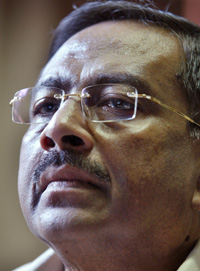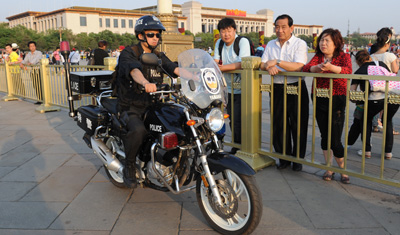Foreign broadcasters shut down for Cambodian elections
How far has democracy advanced in Cambodia? Not very far. Activists from three different political parties died during the 15-day campaign period leading up to the elections, in which the ruling Cambodian People’s Party won a large majority of seats, according to a report issued by the Committee for Free and Fair Elections in Cambodia…

How times change in Sri Lanka, and how they don’t
For a good historical perspective on the abuse of journalists in Sri Lanka, Iqbal Athas, the recipient of a 1994 International Press Freedom Award from CPJ, wrote a center-page spread for the 25th anniversary edition of the Sunday Times, a popular weekly in Colombo. Athas, a critical journalist who specializes in defense issues, works as…
Third witness to Maguindanao massacre killed
The climate of impunity that fostered the November 23, 2009, massacre of 57 people, including 32 journalists, is alive and well not only on the southern Philippines island of Mindanao, where the massacre took place, but in all of the country. The revelation that the brutalized body of a key witness to the killings, Esmail…

A heads-up for Sri Lanka press freedom watchers
Former Attorney General Mohan Peiris has been ordered to testify about a statement he made at the U.N. Committee Against Torture in Geneva on November 9, 2011, in which he said that Prageeth Eknelygoda was alive and living outside the country (see “Sri Lanka’s savage smokescreen”). Peiris will have to appear at the Homogama Magistrate’s Court in…
Computer crime laws belie Thai claim to modern society
At online discussion sites all over the world, comments are posted on the Web as soon as they are written. People argue, inform, express anger, and voice fears. Some say things in the heat of the moment that they might go on to regret. Others are elliptical and obscure. The enabling of such conversations is…
Free expression in Americas goes beyond left or right
On Sunday the general assembly of the Organization of American States will convene in Bolivia in the verdant, highland valley city of Cochabamba. The 35 member states (every nation in the region except Cuba) are expected to vote on a measure that, if passed, could curtail free expression and press throughout the hemisphere and put…

23 years after Tiananmen, China is still paying
The annual crackdown on commemorations of the June 4 anniversary of the brutal suppression of student-led demonstrations based in Tiananmen Square in 1989 Beijing is under way, according to Agence France-Presse. What’s concerning is the number of writers and activists for whom “crackdown” is the new normal.
Mission tells Nepal: No excuse for deferring press freedom
As Nepal’s constituent assembly failed to meet Sunday’s deadline for the passage of a new constitution, a new report released this week on the risks to Nepal’s media should remind political parties that peace and stability are not prerequisites to media freedom but rather that a strong, independent press operating without fear is a requirement…
Rising violence in Pakistan’s warring Baluchistan
The murder of a part-time journalist and a gunfire attack on the house of the president of the Turbat Press Club, both on May 28, underscore the nature of the escalating violence in Baluchistan. According to the Delhi-based Institute for Conflict Management, which monitors violence across South Asia, at least 10 people were killed in…

Sina ‘information credit score’ restricts Weibo users
Sina’s Twitter-like microblog service Weibo has released new guidelines to restrict users who share banned content, according to international news reports. It’s the first time such guidelines target users who adopt puns, homonyms, and other veiled references to discuss censored news stories without using keywords on the propaganda department’s blacklist, the reports said.